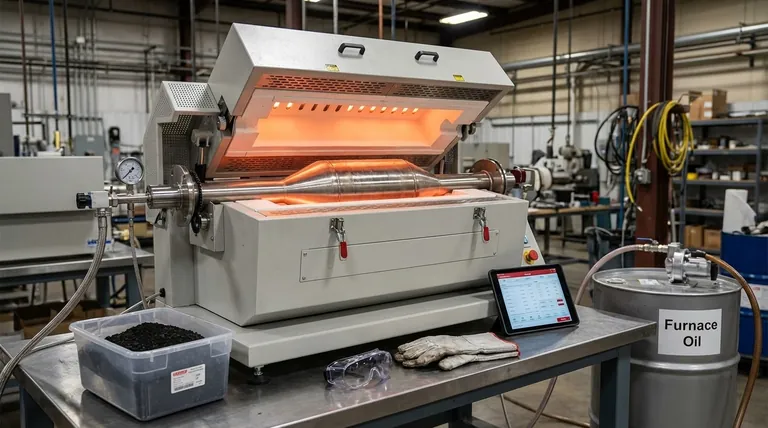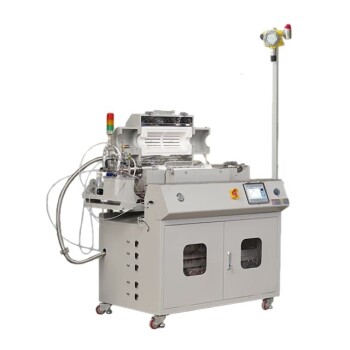The short answer is versatility. A rotary furnace is designed for operational flexibility and can be powered by pulverized solid fuels, various liquid fuels, or gaseous fuels depending on the specific application and economic factors.
The key takeaway is that the fuel for a rotary furnace is not a fixed specification but a variable chosen to optimize the processing of a specific material—from powders and granules to scrap metal and battery paste.

The Principle of Fuel Flexibility
The design of a rotary furnace, with its rotating cylindrical chamber, separates the heating mechanism from the material being processed. This allows for a wide range of fuel types to be used without necessarily contaminating the charge.
How Fuel is Introduced
Fuel is typically injected through specialized burners or nozzles located in a stationary section of the furnace, often at one end. The flame and hot gases are directed down the length of the rotating tube, transferring heat to the material.
Common Fuel Categories
The furnace can be adapted to use the most economically viable or process-appropriate energy source available. This includes pulverized solids like coal, liquid fuels such as furnace oil, and gaseous fuels like natural gas.
How the Material Dictates the Fuel Choice
The selection of fuel is directly linked to the material being processed and the desired outcome. The furnace's ability to handle everything from powders to metallurgical drosses requires this adaptability.
Heat Treatment of Powders
When processing granular or powdered materials, the primary goal is uniform and controllable heat. Gaseous or liquid fuels often provide more precise temperature regulation, which is critical for achieving specific material properties.
Metallurgical Processing
In applications like lead smelting from battery paste or refining drosses, the fuel can constitute 10-30% of the charge's total mass. Here, the choice may be driven by cost and the required thermal energy, making pulverized solid fuels a common option.
Controlling the Atmosphere
The process may require a specific atmosphere, such as air or an inert gas, to prevent unwanted chemical reactions. The burner and fuel system must be designed to accommodate this, ensuring the combustion products do not negatively impact the final product.
Understanding Key Operational Factors
While flexible, the choice of fuel and the furnace's operation come with important considerations and limitations that impact efficiency and success.
Fuel is a Significant Cost
The fact that fuel can make up a large portion of the charge mass highlights its importance as a major operational cost. The efficiency of the burners and the heat transfer within the furnace are critical for economic viability.
Material Suitability is Crucial
The system is not universally applicable. Materials that become sticky or agglomerate at high temperatures are not suitable for a rotary furnace, as they will build up on the internal walls and disrupt the process flow, regardless of the fuel used.
Making the Right Choice for Your Process
The optimal fuel is determined by your primary operational goal.
- If your primary focus is cost-efficiency in bulk processing: Pulverized solid fuels are often the most economical choice for delivering high thermal energy.
- If your primary focus is precise temperature control and purity: Gaseous and liquid fuels offer superior regulation and cleaner combustion, minimizing potential contamination.
- If your primary focus is complex metallurgical reactions: The fuel choice must be integrated with the charge chemistry, as its byproducts could influence the final bullion or matte.
Ultimately, the rotary furnace's value lies in its adaptability to match the right fuel to the right industrial process.
Summary Table:
| Fuel Type | Common Examples | Primary Use Case |
|---|---|---|
| Gaseous Fuels | Natural Gas, Propane | Precise temperature control, cleaner processes |
| Liquid Fuels | Furnace Oil | Versatile heating for various applications |
| Pulverized Solid Fuels | Coal | Cost-effective, high thermal energy for bulk processing |
Optimize your thermal processing with the right equipment and expertise.
Choosing the correct fuel is just one part of the equation. The right furnace design is critical for efficiency and product quality. KINTEK specializes in high-performance lab equipment and consumables, serving diverse laboratory and industrial processing needs.
Our experts can help you select the ideal system for your specific material and fuel requirements, ensuring precise temperature control and maximum operational efficiency.
Contact KINTEK today to discuss your application and discover how our solutions can enhance your process.
Visual Guide

Related Products
- Rotary Tube Furnace Split Multi Heating Zone Rotating Tube Furnace
- Vacuum Sealed Continuous Working Rotary Tube Furnace Rotating Tube Furnace
- Electric Rotary Kiln Small Rotary Furnace for Activated Carbon Regeneration
- Laboratory Vacuum Tilt Rotary Tube Furnace Rotating Tube Furnace
- 1700℃ Laboratory High Temperature Tube Furnace with Alumina Tube
People Also Ask
- Can you use pyrolysis on plastic? Unlock the Potential of Chemical Recycling
- What is the yield of biochar in pyrolysis? Control Your Output from 10% to 30%+
- What are the properties of pyrolysis? A Guide to Tunable Waste-to-Product Conversion
- How does pyrolysis help the environment? Transform Waste into Renewable Energy and Carbon Sequestration
- What is the difference between pyrolysis combustion and gasification? A Guide to Thermal Conversion Technologies
- What are the products of pyrolysis of wood? A Guide to Biochar, Bio-oil, and Syngas Yields
- What is the flash pyrolysis process? Maximize Liquid Bio-Oil Yield from Biomass & Plastic
- How is torrefaction different from pyrolysis biochar? A Guide to Biomass Thermal Conversion



















